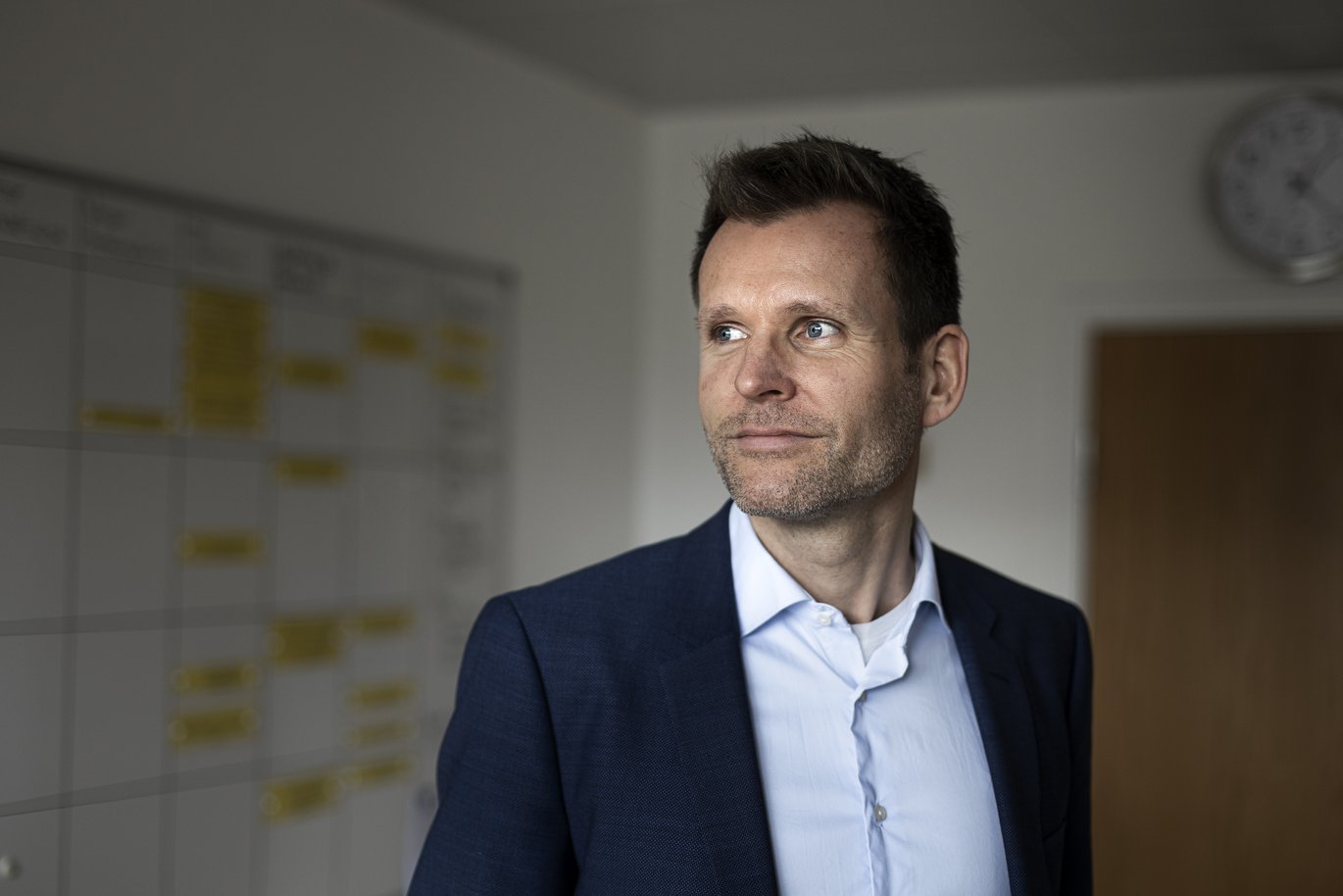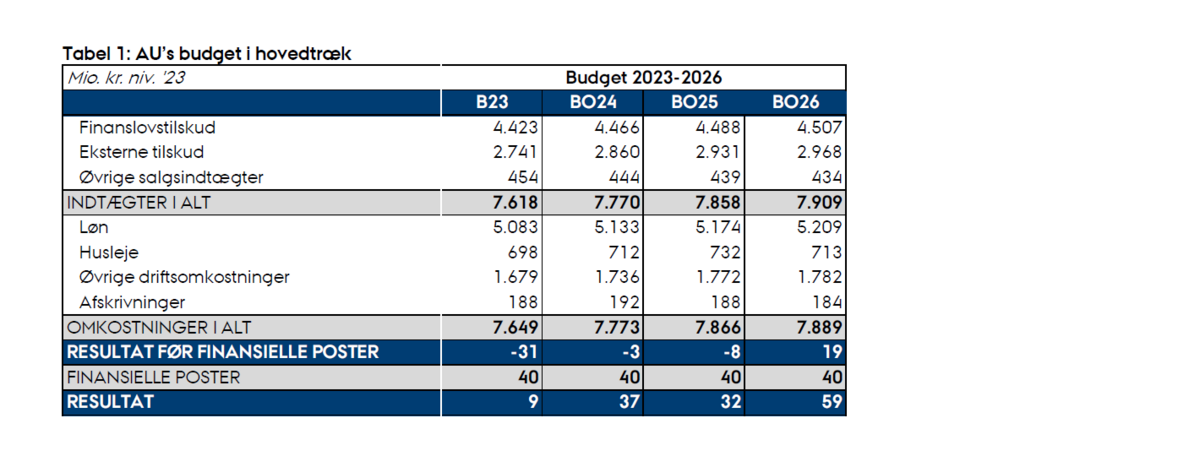Financial statement: AU lost almost DKK 300 million last year
Aarhus University ended 2022 with a deficit of DKK 292 million according to the annual report recently approved by the board. Losses in the financial markets have been the cause of the significant deficit. The university needs to restore its equity. However, faculties currently in the process of reducing costs will not have to cover the three-digit loss in AU’s investments, says the university director.

2022 was financially a tough year for Aarhus University. The university ended the year with a deficit of DKK 292 million, as can be seen in the annual report recently approved by the board.
DKK 257 million of that deficit was related to losses on financial items, i.e. the university’s investments. An additional DKK 36 million of the deficit was due to operating costs. This is the same amount that the university was in deficit in 2020. However, in 2020, the budget was balanced due to profits made on financial items as is the usual situation. The last time financial items were in deficit was 2015. In 2021, the operating deficit was DKK 19 million. However, there were millions of kroner in revenue from investment returns so the budget ended in a surplus of DKK 14 million.
The year 2022 was vastly different from previous years because AU’s financial items ended the year in such a significant deficit.
"The financial items have taken a beating. However, we haven’t lost more than anyone else if we compare our results with the other universities, and we’re at the same level as the pension funds. This of course doesn’t mean that the deficit is satisfactory. It’s not satisfactory at all," says University Director Kristian Thorn and he continues:
"What made 2022 special was that the value of bonds and shares fell simultaneously. This hasn’t happened in decades. It seems reasonable to ask how we as a university can lose money on financial items. In this context, it’s important to know that we’re obliged to invest our surplus liquidity. We’re not allowed to have the university's funds sitting in an account. Of course, having your liquidity sitting at 0 per cent interest isn’t ideal, but we’re not allowed to do that either," he says.

Cost-saving initiatives brought home DKK 65 million
AU began 2022 with a budgeted operating deficit of DKK 78 million, and ended the year with a DKK 36 million deficit. AU’s operating budget therefore ended in a smaller deficit than expected, even before the war in Ukraine began and sparked a number of economic consequences around the world.
The university originally budgeted a deficit of DKK 48 million after financial items. At the beginning of the year, AU therefore expected the university's investments to make a significant profit. Later in the year, once the war in Ukraine had been ongoing for several months and had made its mark, AU budgeted for a major deficit. During the third quarter of 2022, a deficit of DKK 101 million before financial items was expected, and financial items were expected to end the year with a deficit of DKK 251 million. The total deficit of the university was therefore expected to be DKK 351 million.
In other words, AU had saved DKK 65 million on operations compared with the budget at the start of the year. During the last half of 2022, AU management launched a number of cost-saving initiatives such as a temporary hiring freeze and energy-saving initiatives. And they worked.
"It's terrific that we were successful. It’s an indication that the compensatory measures worked: Restraint on salary, reduced energy consumption and overall financial restraint throughout the organisation. I’m so grateful for everyone’s hard work, it was a real joint effort,” says Kristian Thorn.
The university director also emphasises that AU’s turnover in 2022 was higher than recent years. The university had a total operating income of DKK 7.3 billion compared to DKK 6.9 billion in 2021. AU is a growing university he points out.
"A quick glance at the results would make you say: That’s a very large deficit. And it is, no doubt about it. But the results also show that the university is growing and that revenues are on the rise. We’ve been good at attracting external funding. Our operating costs were also much better than budgeted at the beginning of 2022," says Kristian Thorn.
Less risky investments in the future
However, the total deficit of 2022 cannot be ignored. As mentioned above, AU is obliged to invest its excess liquidity in accordance with the Ministerial Order on Investment. The university pays three asset managers to handle its investments. One of their responsibilities is to diversify the risk of investments.
"We have to acknowledge that the usual diversification of risks has not been an efficient bulwark in 2022. The bonds were not the safe haven they used to be. When interest rates increase, bond prices fall. So everyone on the market took serious hits on what’s normally considered a rather conservative form of investment," says Kristian Thorn.
The fact that AU is required to invest its money is one thing. The risk it takes in doing so is something else entirely. At the end of 2022, the board decided that AU’s investments would be reorganised in a more conservative direction. According to Kristian Thorn, the board is discussing how to further reduce the risks of its investments
University operations should not rely on returns on investment
The large deficit has reduced AU’s equity to 8.6 per cent of revenue. It was at 13.3 per cent at the start of 2022, and university policy states equity must be for approx. 10 per cent of revenue. The university will therefore need to rebuild its equity in the coming years and this will be achieved using the university's investment returns. All the while, the administration and faculties will work on balancing their operating budget so they no longer need to be supported by AU’s equity, thereby ensuring that AU will no longer be dependent on returns on investment.
The university director feels it is important to make clear that individual faculties will not have to cover the very large losses on financial items. Those losses are not the reason why Natural Science, Aarhus BSS and Arts have to make cutbacks in the tens of millions in the coming years, says Kristian Thorn.
“We’ve been able to use investment returns to support operations for several years. The board has decided that this won’t be possible going forward. Operating budgets will be need to be balanced locally. The strategy therefore isn’t that operations need to generate a surplus that can be added to the university’s equity, but rather that operations should be able to support themselves, which is a healthy principle for any company,” says Kristian Thorn.
University Director: Very sorry about the need for adjustments
The university director acknowledges that the lack of returns to cover the deficit is putting financial pressure on some faculties.
There will be tight but not impossible budgets at the university in the coming years, he explains. AU expects an operating budget deficit of DKK 31 million in 2023, a deficit of DKK 3 million in 2024, a deficit of DKK 8 million in 2025, and finally a profit of DKK 19 million in 2026.
"Balancing the operating budget will require making adjustments. Natural Sciences is in the middle of a difficult process, where they have to make significant cost reductions over the next few years. As part of this, they’ve implemented measures to prevent redundancies such as voluntary redundancy and senior staff schemes. Nat is also working on other elements of its operating budget," says Kristian Thorn.
"I'm sorry that some faculties need to make adjustments in order to get back in track financially. But I’d like to emphasise that we need a healthy economy in order to run a strong university. So we need to set things right," he says.
Kristian Thorn explains that there are several structural changes that will affect faculties such as Aarhus BSS, Nat and Arts. The changes include degree programme resizing, relocation and a reduced intake of students.
"In 2022, we had a budget deviation of DKK 32 million for full-time degree programmes. Unfortunately, we’ve also experienced a decline in educational activity. This is mainly due to students rejecting their offered places on programmes, and doing so to a greater extent than we’re accustomed to. But there’s reason to be happy about this year’s quota 2 intake as it shows that a number of study programmes are returning to previous levels,” says Kristian Thorn.

Tempered expectations
AU’s asset managers expect investments in the coming years to yield a return on investments of about 3.5- 4 per cent. AU itself budgeted with an investment return of 1.9 per cent, which corresponds to a surplus of DKK 40 million on financial items.
With the upcoming adjustments to operations, the university is expected to balance its budget, says the university director. And he does not expect any unpleasant surprises during the year.
"We have tempered our expectations for the returns on investment in the coming years. If we reduce some of the risk in our portfolio, we may see a lower yield than the DKK 40 million, and we’ll then make the necessary adjustments. However, our operating budget does not depend on financial items,” he says.
If we once again experience a year with negative returns on investment, the situation will be completely different.
“It’s clear that we won’t reach our target if we once again have a deficit on financial items in 2023. Luckily, it doesn’t look like we’re heading in that direction. Equity gives us a bit of padding during bad times. 2022 was exactly the kind of rainy year that needed the bulwark of equity to stem the tide. Healthy financial management requires having reserves in place so a loss of this size for one year doesn’t drown us,” says Kristian Thorn.

